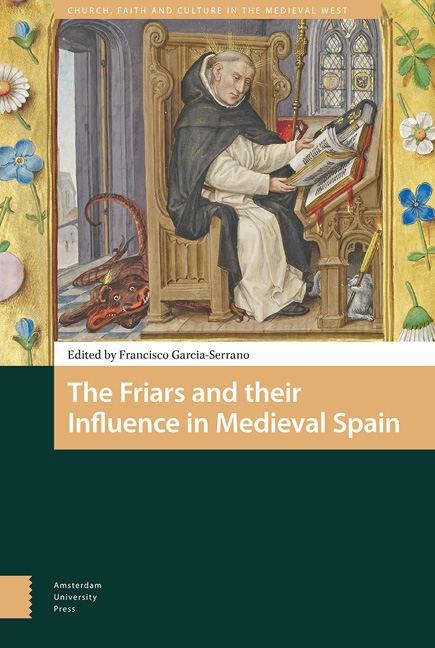Book contents
- Frontmatter
- Contents
- Abbreviations
- List of Illustrations
- Acknowledgements
- Introduction
- 1 Dominicus Hispanus
- 2 Ramon de Penyafort and His Influence
- 3 The Mendicant Orders and the Castilian Monarchy in the Reign of Ferdinand III
- 4 Ramon Marti, the Trinity, and the Limits of Dominican Mission
- 5 Narrative and Counter-Narrative: Dominican and Muslim Preaching in Medieval Iberia
- 6 The Poor Clares of Alcocer and the Castilian Crown (Thirteenth to Fifteenth Centuries)
- 7 Friars and Nuns: Dominican Economy and Religious Identity in Medieval Castile
- 8 Networks of Dissent and the Franciscans of the Crown of Aragon
- 9 Faction, Politics, and Dominican Inquisitors in the Fourteenth-Century Crown of Aragon
- 10 Sutzura e Viltat Carnal: The Place of Sin and Lust in the Treatises of the Franciscan Francesc Eiximenis (c.1400)
- 11 Valencian Dominicans Beyond the Convent of Santo Domingo
- 12 Ferdinand of Antequera and Santo Domingo el Real de Toledo: Patronage, Advice, and Spiritual Favour (c.1390–1416)
- Index
2 - Ramon de Penyafort and His Influence
Published online by Cambridge University Press: 16 February 2021
- Frontmatter
- Contents
- Abbreviations
- List of Illustrations
- Acknowledgements
- Introduction
- 1 Dominicus Hispanus
- 2 Ramon de Penyafort and His Influence
- 3 The Mendicant Orders and the Castilian Monarchy in the Reign of Ferdinand III
- 4 Ramon Marti, the Trinity, and the Limits of Dominican Mission
- 5 Narrative and Counter-Narrative: Dominican and Muslim Preaching in Medieval Iberia
- 6 The Poor Clares of Alcocer and the Castilian Crown (Thirteenth to Fifteenth Centuries)
- 7 Friars and Nuns: Dominican Economy and Religious Identity in Medieval Castile
- 8 Networks of Dissent and the Franciscans of the Crown of Aragon
- 9 Faction, Politics, and Dominican Inquisitors in the Fourteenth-Century Crown of Aragon
- 10 Sutzura e Viltat Carnal: The Place of Sin and Lust in the Treatises of the Franciscan Francesc Eiximenis (c.1400)
- 11 Valencian Dominicans Beyond the Convent of Santo Domingo
- 12 Ferdinand of Antequera and Santo Domingo el Real de Toledo: Patronage, Advice, and Spiritual Favour (c.1390–1416)
- Index
Summary
Abstract
This chapter explores the long and varied career of Ramon de Penyafort, a thirteenth-century Dominican who had a lasting impact on the development of canon law, the history of the Dominican Order, and the lands of the Crown of Aragon. Various works of his student days at Bologna are examined, as well as the Summa de Casibus and the Liber Extra. His role in revising the constitutions of the Dominicans while master general is described. There is also a discussion of his influence on legislation concerning the reconciliation of heretics, the conversion of Muslims, and the diminution of the status of Jews in Catalonia. It is argued that, through study of Ramon's various works in combination, it is possible to come to an overall understanding of his character.
Keywords: Ramon de Penyafort, Dominicans, medieval Aragon, canon law, religious history
In the last centuries of the Middle Ages and, of course, later, it was well known that because of their arrogance, delight in subtleties, betrayal of confidences, worthless advice, and chronic overcharging, the spiritual well-being of lawyers was necessarily in great danger. Indeed, particularly in Catalonia, it was thought that lawyers’ prospects in the next world were slight and, more generally, special prayers were devised that the faithful might ask God to pardon the sins of lawyers. Nevertheless, certainly one of their number is considered to have escaped the flames, and that is Ramon de Penyafort, who died in 1275 and was canonized in 1601. He would become a patron saint of lawyers and a lastingly influential figure in the history of the Crown of Aragon, the Dominican Order, and of the law itself.
While very influential, Ramon, although he is not unknowable, is surprisingly little known. It is a century since Thomas Schwertner wrote a short biography in English, and over eighty years since Valls Taberner’s admirable study. In the almost one hundred years of his life – just to take the highlights – Ramon was a professor at Bologna, the author of the Summa de Paenitentia, the compiler of the Gregorian decretals, the master general of the Dominican Order, and the servant of the Crown of Aragon in developing legislation concerning heretics, Muslims, and Jews.
- Type
- Chapter
- Information
- The Friars and their Influence in Medieval Spain , pp. 45 - 60Publisher: Amsterdam University PressPrint publication year: 2018



